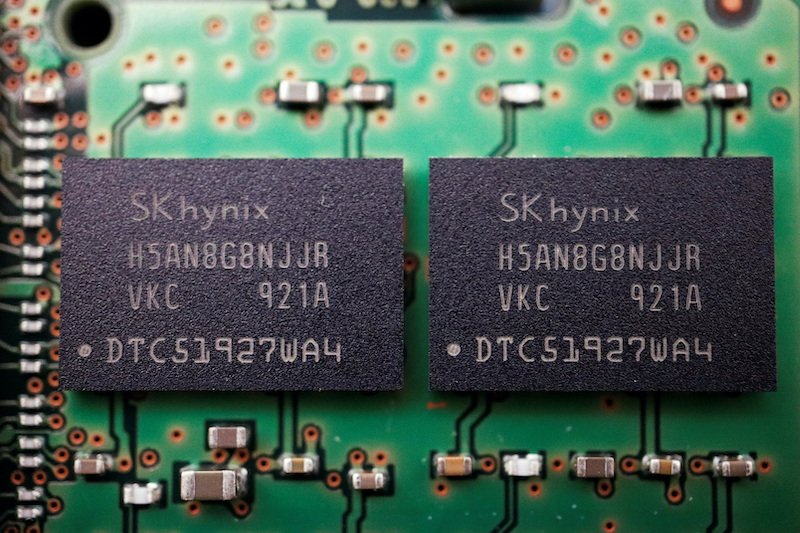US officials are looking at cutting Chinese companies’ access to artificial intelligence chips through units located overseas.
The Biden administration is keen to close a loophole in restrictions it imposed in October 2022, sources have said.
The United States’ move last year shook relations with Beijing when it unveiled the restrictions on shipments of AI chips and chipmaking tools to China, in a bid to thwart its military advances.
Those rules are set to be tightened in the coming days. A person familiar with the situation said the measure could be included in those new restrictions.
ALSO SEE: China Births Slump to Record Low, Prompting Economic Warnings
China ‘watching closely’
China’s foreign ministry said on Friday the country will closely follow possible moves by the US to close the loophole that gives its companies access to American artificial intelligence chips via units located overseas.
“China will continue to closely follow the relevant situation and will protect the legitimate rights and interests of Chinese companies,” spokesperson Wang Wenbin said at a regular press briefing.
In the initial round of curbs, the Biden administration left overseas subsidiaries of Chinese companies with unfettered access to the same semiconductors, meaning they could easily be smuggled into China or accessed remotely by China-based users.
Reports in June said that the very chips barred by US regulations could be purchased from vendors in the famed Huaqiangbei electronics area in the southern Chinese city of Shenzhen.
Washington is now mulling ways to close the loophole, sources said, a move that has not been previously reported.
Difficult to cut China from top AI tech
The efforts to close the loophole show how the Biden administration is struggling to cut China off from top AI technology and how difficult it is to plug every gap in export controls.
“Absolutely, Chinese firms are purchasing chips for use in data centers abroad,” said Greg Allen, a director at the Center for Strategic and International Studies, noting that Singapore is a big hub for cloud computing.
The Commerce Department declined to comment. A representative from the Chinese Embassy in Washington did not immediately respond to a request for comment. China’s Ministry of Commerce has previously accused the US of abusing export controls and called for it to “stop its unreasonable suppression of Chinese companies.”
While it would be illegal under US law to ship those AI chips to mainland China, it is very difficult for the United States to police those transactions, experts said, noting that China-based employees could legally access the chips located at foreign subsidiaries remotely as well.
“We don’t actually know how big a problem this is,” said Hanna Dohmen, a research analyst at Georgetown University’s Center for Security and Emerging Technology (CSET).
China’s AI capability dependent on US chips
The United States has been seeking to halt the rise of China’s artificial intelligence capability, which helps its military develop unmanned combat systems, according to a report in The International Affairs Review, affiliated with George Washington University’s School of International Affairs.
China’s AI capability depends on its access to US chips. CSET found in a June 2022 report that out of 97 individual AI chips procured via Chinese military tenders over an 8-month period in 2020, nearly all of them were designed by US-based companies Nvidia, Xilinx, Intel, and Microsemi.
Washington has been working to close other loopholes that allow the AI chips into China. In August, it told Nvidia and AMD to restrict shipments of the AI chips beyond China to other regions, including some countries in the Middle East.
Sources said the new rules on AI chips expected this month will likely apply those same restrictions more broadly to all companies in the market.
It is less clear how the US government might close the loophole allowing Chinese parties to access US cloud providers like Amazon Web Services, which give their customers access to the same AI capabilities.
But sources say the Biden administration is grappling with that issue as well.
“Chinese persons can completely legally access the same chips from anywhere in the world. There are no rules about how they can be accessed,” said Timothy Fist, a fellow at Washington-based think tank Center for a New American Security.
- Reuters with additional editing by Jim Pollard
NOTE: This report was updated on October 13, 2023 to include China’s response to this news.
ALSO SEE:
US Warns China: Chip Export Curbs Will be Updated Soon
ASML to Ship Top Tech to China Even as Dutch Chip Ban Starts
Rumours of 5G Chip in New Huawei Phone Fuel China Chip Rally
China Offering Millions to Foreign-Trained Chip, Tech Talents
Japan Joins Chip Curbs on China, Despite Unease in Tokyo
Chinese Envoy Warns US: More Chip Bans and We’ll Hit Back
US Chip Sanctions Have Hardly Impacted China’s AI Capability
Chinese Tech Giants Rush to Buy Nvidia’s Top AI Chips – FT
























